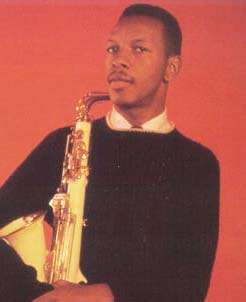| Ornette Coleman  Born: 19-Mar-1930 Born: 19-Mar-1930
Birthplace: Fort Worth, TX
Died: 11-Jun-2015
Location of death: Manhattan, NY
Cause of death: Heart Failure
Gender: Male
Race or Ethnicity: Black
Sexual orientation: Straight
Occupation: Jazz Musician Nationality: United States
Executive summary: Free Jazz innovator One of the primary movers behind the development of avant-garde and free improvisational jazz in the 1950s, Ornette Coleman began his life in a poor, working class family in the then-segregated city of Fort Worth. By the time Coleman was seven his father had died, leaving his mother to support the family working as a seamstress; despite their difficult circumstances, she put money aside to buy her son his first saxophone (an alto) when he was 14. After teaching himself how to sight-read with the instrument, Coleman began playing with local R&B bands before moving on to find work first in New Orleans and later in Los Angeles as a member of the Pee Wee Crayton Band. By this time he had come under the influence of the emerging bop idiom -- and more particularly under the influence of Charlie Parker, whom he learned to imitate perfectly. By 1952 a permanent move to L.A. was made, where Coleman began to study musical theory in earnest and formulate a radical new approach that he would come to refer to as "harmolodic". These ideas were received with hostility by most audiences, but attracted a group of enthusiastic, adventurous young players, among whom were trumpeter Don Cherry, drummer Billy Higgins and, later, bassist Charlie Haden.
Ornette Coleman's recording debut arrived in 1958 with the release of Something Else!!!! on the Contemporary Records label. A second effort for Contemporary, Tomorrow Is the Question!, appeared in 1959 before a deal with Atlantic Records was arranged, resulting that same year in The Shape of Jazz to Come and Change of the Century. After a period of study at the Lenox School of Jazz, he secured a two-week residency with his new quartet at the Five Spot jazz club in Greenwich Village; the two weeks were soon extended to six, as interest in the ensemble's unconventional style steadily spread. In the course of these performances, Coleman found himself the subject of attacks (sometimes of a physical nature) from jazz listeners and practitioners determined to protect their music from any contaminating vitality and innovation, as well as the recipient of praise from those (such as composer Leonard Bernstein) who felt such developments were perhaps a good thing. He continued to explore this new sound over the next few years with the albums Free Jazz (A Collective Improvisation) (1960), This is Our Music (1960), and Ornette on Tenor (1961), among others; but in 1961 Atlantic lost its nerve and Coleman lost his contract. 1962 was spent largely out of the public eye, as the ever-exploring musician took time out the teach himself to play trumpet and violin.
Coleman's musical interests during the rest of the 1960s broadened to include forms outside of the confines of the jazz field. He began composing pieces for small wind and string ensembles, as well as full-scale symphonic works, a number of which have still yet to be performed or recorded. For a while, concert appearances remained infrequent: a series at the Jazz Gallery and work in a trio format at the New York Town Hall took place in 1962, and another series at Village Vanguard was arranged at the start of 1965. A more rigorous schedule was resumed later in '65, with the Coleman trio touring around the U.K. and Europe before once again becoming active in the states in mid-1966. He proved that his skills at challenging (upsetting) audiences were as sharp as ever when he began to involve his then ten-year-old son Denardo Coleman as a drummer in his projects, the first recorded result of this collaboration being the Blue Note-issued The Empty Foxhole (1966).
In 1972 Coleman was finally given the opportunity to have one of his symphonic works realized: performed by the London Symphony Orchestra, Skies of America was recorded in Paris and then publicly debuted at the Newport Jazz Festival three months later. The following year he traveled to Morocco to investigate the ritual music of The Master Musicians of Jajouka; the inspiration gained from this visit eventually found expression in the album Dancing in Your Head, the first offering by Coleman's electric ensemble Prime Time. Prime Time was subsequently expanded into a backing double trio of electric guitar, electric bass and drums, integrating aspects of jazz, rock, funk, R&B and world music under the guiding principles of harmolodic theory.
Coleman maintained his explorations of new musical territories throughout the 80s and 90s, collaborating with artists ranging from Pat Metheny to the Kronos Quartet to The Grateful Dead, as well as continuing his work with Prime Time and making further ventures into classical/chamber composition. Recognition of his innovations at last began to become evident during these decades: the documentary Ornette: Made in America was released in 1985, and a 2-concert celebration of his work was presented at Carnegie Hall in 1987. His ability to provoke controversy was not buried under accolades, however, and a tour with a troupe of body piercing enthusiasts in the 90s once again ruffled feathers in his audiences. In 1995 he launched his own Polygram-associated Harmolodic label with the release of Prime Time's Tone Dialing, quickly followed by Colors, Hidden Man and Three Women (all 1996). He died in 2015. Wife: Jayne Cortez
Son: Denardo Coleman (musician, b. 1956)
University: Lenox School of Jazz, MA (1959)
The Ornette Coleman Quartet Bandleader/Multi-Intrumentalist (1959-)
Prime Time Multi-Instrumentalist (1975-)
NEA Jazz Master 1984
Pulitzer Prize for Music 2007 for Sound Grammar
FILMOGRAPHY AS ACTOR
Chappaqua (1966)
Official Website:
http://www.harmolodic.com/
Requires Flash 7+ and Javascript.
Do you know something we don't?
Submit a correction or make a comment about this profile
Copyright ©2019 Soylent Communications
|